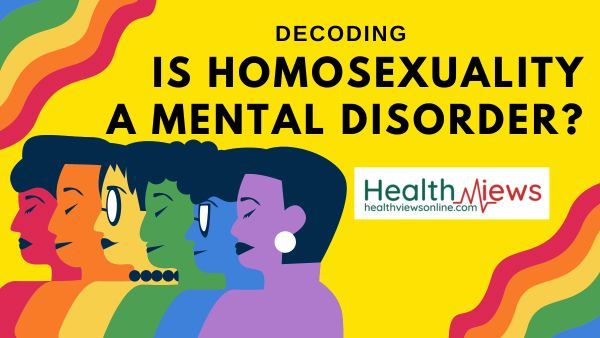The understanding of homosexuality has evolved over time, and it is now widely recognized as a normal and natural variation of human sexuality. Sexual orientation, including homosexuality, is not a choice or a result of any psychological disturbance. It is simply a natural aspect of human diversity. So, when you ask – Is homosexuality a mental disorder? The answer is – No, homosexuality is not considered a mental disorder.
What are the Evidences that Prove Homosexuality is not a Mental Disorder?
The understanding that homosexuality is not a mental disorder is based on a growing body of scientific evidence, as well as the consensus of professional organizations dedicated to mental health. Here are some key points and evidence that support this conclusion:
Professional organizations’ stance: Major professional organizations, such as the American Psychological Association (APA), the American Psychiatric Association (APA), the Indian Psychiatric Society (IPS) and the World Health Organization (WHO), have explicitly stated that homosexuality is not a mental disorder. These organizations base their positions on scientific research, clinical expertise, and a thorough review of available evidence.
Lack of evidence for pathology: Extensive research has failed to find any inherent pathology or mental illness associated with homosexuality. Numerous studies have shown that homosexual individuals are as psychologically healthy as their heterosexual counterparts.
Normal variation of human sexuality: Human sexuality exists on a spectrum, and homosexuality is a natural and normal variation within that spectrum. It is estimated that around 3-10% of the population identifies as homosexual or experiences same-sex attraction, and this prevalence is consistent across cultures and historical periods.
Consistency across cultures: Homosexuality has been documented in various cultures throughout history, demonstrating that it is not confined to a particular society or time period. The fact that same-sex attraction occurs across diverse societies and has existed throughout human history suggests that it is a natural and inherent aspect of human sexuality.

Genetic and biological factors: Numerous studies suggest that sexual orientation, including homosexuality, has a biological basis. Research has explored genetic, hormonal, and neurological factors that may contribute to the development of sexual orientation. Although no single “gay gene” has been identified, studies have found evidence of a complex interplay between genetic, hormonal, and environmental factors that shape sexual orientation.
Lack of changeability: Efforts to change or convert sexual orientation through therapies or interventions have been widely discredited by professional organizations. The consensus is that sexual orientation is not a choice and cannot be changed through therapy. Research has shown that attempts to change sexual orientation can be harmful and lead to distress, depression, and other psychological problems.
These points collectively provide a strong body of evidence indicating that homosexuality is not a mental disorder but rather a normal and natural variation of human sexuality. So, next time somebody asks, Is Homosexuality a mental disorder, you know how to explain.
It’s important to note that there may be individuals who struggle with their sexual orientation due to societal prejudice, discrimination, or personal acceptance issues. In such cases, seeking support from mental health professionals can be beneficial to address the emotional challenges associated with social stigma, but being homosexual itself is not considered a mental disorder.
Why It is connected with mental disorder?
The notion that homosexuality is connected with mental disorder is a misconception that has been perpetuated in the past due to societal and cultural biases. However, it is important to clarify that there is no inherent connection between homosexuality and mental disorder. Here are a few reasons why this misconception may have arisen:
Historical context: In the past, it was widely stigmatized and criminalized in many societies. This stigma led to the classification of homosexuality as a mental disorder by some medical and psychiatric professionals. However, this classification was based on social and cultural biases rather than scientific evidence.
Diagnostic history: Until 1973, homosexuality was listed as a mental disorder in the Diagnostic and Statistical Manual of Mental Disorders (DSM), published by the American Psychiatric Association. The decision to remove homosexuality from the DSM was driven by scientific research, changing social attitudes, and the understanding that homosexuality does not meet the criteria for a mental disorder.
Prejudice and discrimination: Homosexual individuals have historically faced significant prejudice, discrimination, and social marginalization. These societal pressures can contribute to psychological distress and mental health challenges. However, it is important to recognize that the distress experienced by LGBTQ+ individuals is not inherent to their sexual orientation but rather a result of societal intolerance.
Misinformation and stereotypes: Negative stereotypes and misinformation about homosexuality have perpetuated harmful beliefs and contributed to the misconception that homosexuality is linked to mental disorder. However, these stereotypes are unfounded and do not align with the current scientific understanding of sexual orientation.
It is crucial to rely on scientific research and the consensus of professional organizations when discussing topics related to mental health and sexual orientation. The overwhelming body of evidence supports the understanding that homosexuality is a normal and natural variation of human sexuality and not a mental disorder.
Also Read: LGBTQ+ Bullying: 10 Types of Bullying LGBTQ Community Face On a Daily Basis





